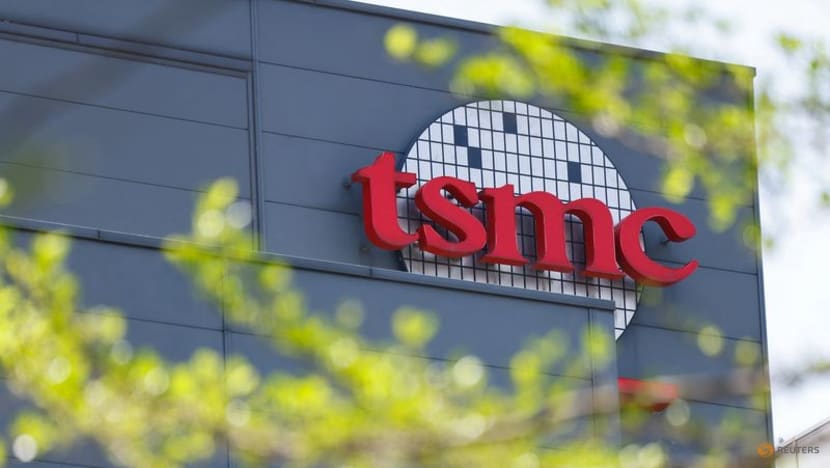Commentary: Espionage and tariffs can’t tarnish TSMC’s crown
It’s been a long week for the world’s largest chipmaker. But it’s still selling the shovels during an AI gold rush, says Catherine Thorbecke for Bloomberg Opinion.

The TSMC logo is displayed on a building in Hsinchu, Taiwan, Apr 15, 2025. REUTERS/Ann Wang/ File Photo

This audio is generated by an AI tool.
TOKYO: An attempt to steal trade secrets from the world’s largest chipmaker and renewed tariff threats on semiconductors are bending Taiwan’s “silicon shield”. But it’s not breaking just yet.
Still, heavy is the head of TSMC, whose technology everybody wants a piece of. Less than a day after news broke that TSMC fired several employees for a suspected attempt to obtain critical information on its cutting-edge manufacturing, US President Donald Trump threatened new chip tariffs “of approximately 100 per cent”.
On Thursday, Taiwan confirmed that TSMC is exempt from the latest levies due to its investments in the US. But Trump still sowed a lot of confusion after stating in an interview earlier this week that Taiwan was “coming over and spending US$300 billion in Arizona, building the biggest plant in the world”. TSMC had previously only committed US$165 billion, suggesting negotiations might not be over.
Trump likely realised that new, sky-high tariffs on TSMC would be a blow to US tech ambitions. Domestic titans at the heart of maintaining America’s lead over China, such as Nvidia and Apple, are TSMC’s biggest customers. And fresh levies would be an own-goal for the Stargate artificial intelligence infrastructure plans Trump announced earlier this year, which rely on hundreds of thousands of advanced chips.
The news of a tariff reprieve helped drive TSMC’s shares to a record on Thursday.
TSMC’s multi-billion-dollar expansion efforts in the US haven’t always gone over well at home. Some patriotic Taiwanese want the chipmaker to keep core technologies within the self-ruled island as a safeguard from potential Beijing aggression.
But expanding manufacturing to the US will only strengthen Taiwan’s alliance with Washington and give its footprint room to grow. It’s also worth recognising that TSMC and Silicon Valley are on the same side when it comes to countering China.
MORE QUESTIONS THAN ANSWERS OVER LEAK
Still, tariffs may not be the company’s biggest headache. The potential corporate espionage is far more than a run-of-the-mill commercial intellectual property theft. It’s being investigated under Taiwan’s national security law and has the potential to spiral into a broader geopolitical spat.
At this stage, there are more questions than answers. The scope of the leak, the perpetrator and the motive haven’t been disclosed. Still, TSMC has said it was able to identify the issue “early”.
On Thursday, Tokyo Electron confirmed that a former employee was involved in the case, though said an internal probe hadn’t found evidence of the confidential information being shared with a third party.
Local prosecutors have made half a dozen arrests, and the people involved were reportedly targeting information on the company’s 2-nanometer production – the most advanced chip manufacturing technology in the world.
Besides TSMC, there are only three other companies that are actively trying to mass produce the cutting-edge chips: Samsung, Intel and Japan’s long-shot startup Rapidus. Many of them rely on the same suppliers, such as Tokyo Electron.
Acquiring the critical know-how for smaller chip node production can cost tens of billions of dollars in research and development. There are other reasons so few firms are capable of attempting this. Even with the R&D knowledge, it still requires massive investments in fabrication plants and tooling equipment, as well as access to a very limited supply of trained engineers to compete at scale.
Taiwan and TSMC have spent decades building this foundation, and there aren’t clear shortcuts to leapfrog the company’s dominance – even unethical ones. Countries and companies have poured billions trying to eclipse TSMC’s virtual monopoly on advanced chipmaking, but these hard-won gains can’t be spread (or stolen) overnight.
The firm is also no stranger to talent poaching and other attempts at IP theft; it’s a systemic issue in an industry where the strategic importance is so high. The most recent case is spurring international whodunnit intrigue, but more importantly, it shows that the company has beefed up internal security protocols to rapidly respond.
CRUCIAL FOR TSMC TO MAINTAIN ITS EDGE
It can’t be overstated how important it is for TSMC to maintain its technology edge. Some 24 per cent of the most recent quarterly revenue came from its 3-nanometer tech. Demand is already high for the company’s next-generation nodes, set to go into mass production later this year. TSMC’s dominance gives it the power to set prices at a time when the foreign exchange rate is unfavourable and trade uncertainty looms.
This tech advantage has not just proven crucial for TSMC’s business. It is giving Taiwan’s government leverage via so-called semiconductor diplomacy. The potential leak gives new fuel to critics of President Lai Ching-te, who has had a rough few weeks.
As the first chips-related case involving the National Security Act, it’s imperative that authorities investigate and respond to the fullest extent of the law. Taipei must set a precedent with this case to deter any future attempts.
As my colleague Howard Chua-Eoan has written, history shows us that technological secrets and monopolies have a hard time staying that way in the long run. For now, TSMC is selling the shovels during a global AI gold rush. Even tariff threats and espionage attempts can’t tarnish its crown just yet.















